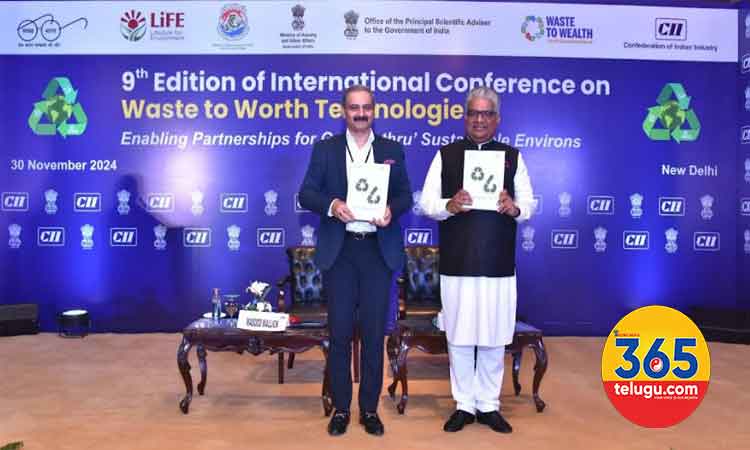365Telugu.com online news, December 3rd,2024: “Let’s aspire for a Green & Sustainable Viksit Bharat. Our goal is to achieve zero waste and ensure eco-friendly production. We must focus on creating a skilled workforce specializing in processing, recycling technology, and eco-friendly product design,” said Bhupender Yadav, Minister of Environment, Forest, and Climate Change, Government of India, at the CII’s 9th International Conference on Waste to Worth.
Tokhan Sahu, Hon’ble Minister of State for the Ministry of Housing and Urban Affairs, Government of India, emphasized the importance of turning adversity into opportunity through the principles of waste to worth, adding that the Government is implementing key initiatives to fast-track the development of cities and states.

“Waste scrap is an important medium in transforming cities into smart cities, and the National Circular Framework developed by CII is a step in that direction,” he remarked.
In his address, Bhupender Yadav stressed that while focusing on a Viksit Bharat, we must also prioritize a Green and Sustainable Bharat. He emphasized the importance of a circular economy, which aims to reduce waste by focusing on recycling, reusing, and reducing waste at every stage, from product design to end-of-life management. His vision included creating a workforce skilled in processing, recycling technologies, and eco-friendly product design, and treating waste not as a burden but as a valuable resource.
Yadav also highlighted several government policies related to Waste to Worth, including the Plastic Waste Management Rules, Construction and Demolition Waste Management Rules, Battery Waste Management Rules, E-Waste Management Rules, Ash Utilization Notification, and Motor Vehicle Registration and Scrap Policy.
He underscored that effective waste management plays a crucial role in economic resilience, environmental sustainability, and social security.

At the Inaugural Session, Tokhan Sahu urged the importance of using waste as an opportunity for growth, stressing that government policies are designed to accelerate the development of cities and states.
He also pointed out the role of waste scrap in transforming cities into smart cities, with the National Circular Framework acting as a guiding tool.
Baldeo Purusharth, Joint Secretary (ISD), Department of Economic Affairs, Government of India, highlighted India’s progress in building a circular economy, emphasizing global collaboration and innovative initiatives to tackle plastic waste.
He also stressed the need for a system that recognizes waste-to-worth solutions suggested by people without formal degrees or knowledge, underscoring the role of government, industry, and citizens in achieving sustainable development goals.
Mr. Masood Mallick, Chairman of CII National Committee on Waste to Worth Technologies and Managing Director & CEO of ReSustainability, highlighted that renewable energy alone cannot meet net-zero goals, as over 40% of the carbon footprint is embedded in materials like steel, glass, concrete, plastics, and wood. To address this, he advocated for decarbonizing these materials through innovative recycling and resource recovery practices.

During the conference, the second edition of the National Circular Economy Framework (NCEF) was launched by CII. The NCEF offers guidance for developing new business models in waste management and emphasizes life cycle assessment, promoting innovation in circular principles. Prof. Ajay Sood, Principal Scientific Adviser to the Government of India, described NCEF as an important tool to support India’s commitment to a resource-efficient future.
The 5th edition of the CII 4R Awards also took place, with nearly 50 companies being recognized for their excellence in transforming waste into valuable resources. The Grand Award winners included Schindler India Pvt Ltd, Blue Planet Environmental Solutions India Pvt Ltd, EverEnviro Resource Management Pvt Ltd, Gencrest Bio Products Pvt Ltd, Ganesha Ecopet Pvt Ltd, Inclusive Recycling Foundation, and SRM University, Andhra Pradesh.

The conference, attended by over 300 delegates, featured engaging discussions on various topics such as governance, circular economy transition, sustainable growth, and opportunities in waste management. Additionally, nearly 10 companies showcased their waste-to-worth technologies during the event.
